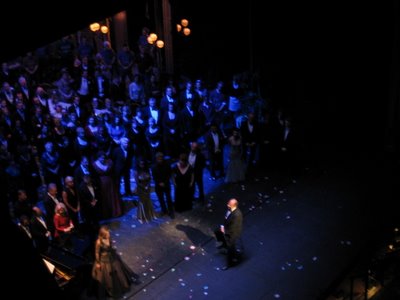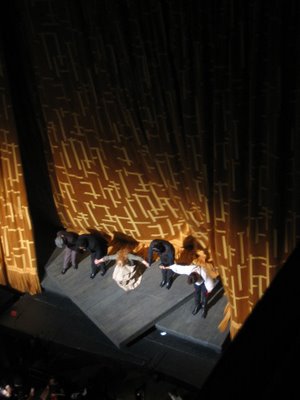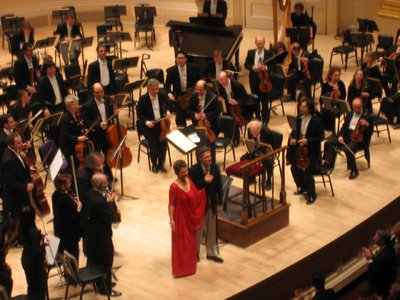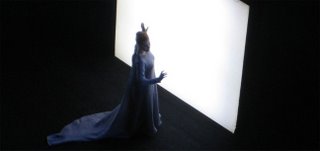
1. Just woke up; had a dream about Roberto Alagna (seriously); Rene Pape, Dmitri Hvorostovsky, and Juan Diego Florez were hot as hot goes, but chubby Bobbie, in that dashing white tux last night, is still the boy who has my number, and who knows how to use it.
2. Dear Sarah B provides pics (including one of Heidi, forever Kundry-cursed to be ticketless) and a nice positive spin on the event. I wish I could be as generous.
[Bagel break.]
3. The only other boy to mount a real challenge to the Bobbie for my heart was the Zajick, who burned everyone's cochleas during her searing "O mon Fernand." There were pounding walls of sound waves, interpolated full, uncheated high Z-flats (sorry, I never bring tuning forks to galas), and then I was like, "Hey Dolora, wtf are you honoring Volpe for? He's given you squat." (She was Adalgisa to Eaglen's Norma, but girl she could have been a glorious Norma herself. And now Gelb won't do anything for her coz she's old-school fat and not a glossy Russian vamp. We're doomed, by the way.)
4. I've never heard Dmitri Hvorostovsky sing with such long lines (and hair). He usually likes to ornament his arias with audible asthmatic aspirations, but this time he took the long Verdian lines of "O Carlo, ascolta" in single breaths. (Take that, David Blaine.) The result was elegant gorgeous. Meanwhile, Rene Pape was in his customary form, a gentleman artist of words and tone: "Ella giammai m'amo" was another clear highlight. Then there's Placido Domingo, defiant, not a day younger than 119 years but whose voice can't be a day older than 19. If he ever decides to take up a career in vocal coaching (on his days off from singing, conducting, administering, recording, selling, selling ...) his first pupil ought to be Ben Heppner, whose ovations come mainly from a relieved audience always fearing the worst. Heppner has beautiful tone and a vigorous thickness, but his excursions above the staff shouldn't be so technically dramatic: i.e., physical pain shouldn't accompany what's supposed to be proud and exuberant. Ben, we were all scared for you.
[Instant noodles break.]
5. And who the f* is Ben Moore? A poor imitation of our very own composer-in-residence NYCOF: "with all due respect" (a la Big Pussy of The Sopranos), Ben Moore should go resume his proper role as a can of house paint. The D.O.A. opener "We're very concerned," an homage to the worst of off-off-Broadway, was aptly titled. We came in not all Kathy Battle sympathizers, but if there ever was a turning point, this would have been it: tired, tasteless, way below the sequined belt, and beneath our beloved Deborah Voigt. (Now Gelb should totally sign Kathy for something ... like, uhm ... the Celestial Voice? High Priestess? Woodbird? That'd sell out the house for sure, Mr. Gelb, believe me.) I really don't care for La Voigt's odd cabaret career, so I won't go much further than to say how thoroughly hot she looked outvamping New York's blondest. The second Moore song "The audience song" came off flatter than Flicka's chest and more annoying than Bill Irwin's career. Poor Suzie Graham. (I'd sue.)
6. Denyce Graves came as the evening's Maria Ewing, blew us all away with that baritonal ooze she used cap her "Can't help lovin' dat man." Waltraud Meier's intense edge was effective for the first half of the aria "Je vais mourir" but was too intense and edgy (oh Sieglinde, how eloquent) for the second half, which succeeds only with a touch of innocent sweetness in the voice, which Ms. Kundry no longer has. Meanwhile, her Santuzza "Regina Coeli" was a total waste of minutes of the universe. Who programs this sh*t? I would have sh*t in my p*nties for Meier's Liebestod, or Mattila's for that matter, or even Debbie Voigt's. Speaking of waste, what was Karita Mattila doing in operettalalaland? (We were pissed in the boxes.)
[Noodles not enough; trip to Chinatown for some soft shell crabs.]
7. Hey Sieglinde, you haven't said one peep about The Beautiful Voice™; what gives? Nothing really, dears. One unshakable thing about Renee Fleming is her constant ability to make it her own, whatever it is. Rodelinda was Handel's before Renee made it her own creation; similarly, Trovatore Leonora's first-act stopper "Tacea la notte placida" and cabaletta "Di tale amor" was firmly Verdi's until Renee reconfigured it to sound distinctly Renee. There were ravishing emanations coming out of her throat, the sound so brilliant in the auditorium, full and mellifluous in all registers, richly hued as fine rosé. (I haven't listened to the radio transmission, but I doubt the mikes were able to pick up the sheer brilliance of that sound.) Coming off of a scintillating Rodelinda (her best evening of the 9 I've seen of the last two seasons, out of 14 total Met performances) where she received wallshaking ovations and curtain call confetti, she is once again enjoying a perfectly tuned instrument (cf. her subpar outing in the first Met Rodelinda this season), just in time for national TV. The interpolations and ornamentations she discharged are at once beautiful and out of place: one quality "forgiving" another. Renee's ethereal floating pianos recall Leontyne Price's ecstasy and ravishment in this aria, but then she swoops up and down the staff and scoops for legato to bring us back down to camp reality. I'd still buy a ticket to her Trovatore: no surprise there. It's just that ... well ... can we enjoy her dolce de leche without the pukey oversweetness? Is it possible? (Short answer: no.)
8. Best salt and pepper soft shell crabs: New York Noodletown, 28 Bowery.
9. Natalie Dessay did a job on "Ah! non credea, mirarti" with characteristic commitment and steely timbre. I'm an unqualified fan of her Zerbinetta and Olympia, two roles that rely heavily on virtuosic technocoloratura. Amina, however, requires more than fireworks: a certain quiet pathos, elusive, steeped in innocence, elevates the role into the third dimension. Dessay approximates this with impressive technical acumen, but ... uhm ... In 2001, I saw her Amina at La Scala opposite the Elvino of a young bel canto tenor named Juan Diego Florez. It was a cold interpretation. Her voice has evolved, and now has considerable interpretative capacity, but ... uhm ... let's just wait for 2008, shall we? (A certain Renata Scotto may have ruined my taste for future Aminas. A few years ago, I was at a masterclass where she demonstrated how to essay Amina's pathetic aria: she held an imagined flower in her hand, and breathed the first lines with a haunting softness I shall never forget.)
10. Speaking of Juan Diego Florez, oh my god. My friggin' god. He melts my ice cream mounds. (With cherry on top.)
11. We interrupt this opera nonsense with pictures of David Wright, the Mets' third base boy. While Sieglinde's a certified Yankee fan (as rabid as VF), she also appreciates that kind of chubby exuberance (e.g., Alagna) on display at Shea. Yanks lost a close game tonight, but this gives us hope for yet another Subway Series in October. (Meanwhile, A-Rod sucks.) Back to David Wright: his autographed used blue sweatband, at $99.99 (plus s/h), makes my $125 gala ticket a Chinatown bargain. (Doubt slowly creeps in as I contemplate the various ways one could enjoy a used sweatband.)
12. Clearly, I'm sleeping with the wrong people. Friend Khaleem reports nicer things from 10th row prime orchestra, where the likes of Anthony Tommasini and Bernard Holland hang out. Great pics of the final bows! We await (a) details promised, (b) more Rodelinda pics, and (c) more gossip about Renee.
[Monday morning.]
13. So heartwarming to see Dame Kiri Te Kanawa on the Met stage again, and for two numbers! Marietta's Lied didn't quite soar with her now limited physics, but her understated elegance made it endearing. Similarly, her Cosi duet with Frederica Von Stade "Ah guarda sorella" (among my favorites) didn't have the lift, with two aged singers trying hard to be youthful sorellas on love's perch, but it reminded opera lovers of what these two singers accomplished in these roles (and in Mozart), and we're nothing if not sentimental about fleeting beauty. Equally important, they looked fabulous as ever, opting for trim pants over gaudy gala gowns.
14. Hodgepodge. Stephanie Blythe did her usual virtuosic thing with "Ah! que j'aime les militaires!". Deborah Voigt came back out for "Du bist der Lenz", which no longer had the magical ease and flow of her old Sieglindes, but the basic elements are still there for a competent Sieglinde, if she ever chooses to go back to the role. (I was afraid she's pushed way beyond Sieglinde at this point.) Still it's a voice in major transition, etc., etc.. Meanwhile, Susan Graham's "Parto, parto" is a soft meadow on a clear day. Olga Borodina, fabulous as fabulous can be, was fabulous in the Italiana Act I finale. Ramon Vargas wasn't in top form for his "Una furtiva lagrima", but it was nonetheless an affecting performance. With his natural ability for line and legato, he was born to sing Nemorino, and that aria in particular. The Fidelio finale to end the evening's printed program had the appropriate celebratory tone, and yet ...
15. Mirella Freni can't pull a Birgit Nilsson (but who can): her unrehearsed speech brought a mixture of endearment and uneasiness to the house, which pretty much set the tone for the close of the evening's festivities. The bent nail shtick needed its own bent nail. Watching the participants gathered around the Fledermaus set was interesting: Natalie Dessay, the bored French woman with a bored look on her bored face, was seated beside the clown Bill Irwin. That combo was exactly how I felt at that point. Renee Fleming delivered the only encore, with the classic "When I have sung my songs", but it did nothing to reverse the anticlimactic end to the evening.
16. What, no Jimmy? Gawd I miss the man. The Parsifals missed him too, by the way. Anthony Tommasini suspects: "Though Mr. Levine was one of the talking heads in a filmed tribute to Mr. Volpe, he was otherwise absent. This month he made it a point to participate in a chamber-music program at Weill Recital Hall to honor the 90th birthday of the composer Milton Babbitt, interviewing the composer onstage. Might he be unhappy with the way he is portrayed — as an artistically brilliant music director who relies on others to fight his battles — in Mr. Volpe's new memoir, 'The Toughest Show on Earth'? Whatever the case, his absence was notable." Let me add that he was also present in the audience during the Met Orchestra performance at Carnegie Hall on May 14. Seems he's well enough to show up at events he deems important. I think Levine's appearance would have made up for Freni, but that's how the show ended: Volpe, respected and admired, but largely "unloved", was greeted with an awkward curtain call. (UPDATE: A reader writes of a sighting of the Maestro in the General Manager's box at some point during the Gala. He may have been there, but the fact remains that he didn't do a more public show of gratitude to Volpe. Would it be so much pain or distraction to do a little walk on stage, a wave at his adoring audience, and a kiss on the cheek for a man he rose to power with?)
17. Other ways to spend your work hours. Fellow blogger Maury (who hates my guts, by the way) does an insightful and hilarious blow-by-blow of the gala's first half. Meanwhile, we await AUV's impressions. Photos can be found at PlaybillArts and at the NYT (multimedia feature). Note: Clive Barnes of the New York Post calls Jean Volpe "the birthday boy's wife" (as in "itcha birthday, itcha birthday, we gunna pahtee like itcha birthday"?). If you're weird and you have a New York Sun subscription, you're weird ... and you can also read their take on the event. In other news, the Washington Post can't spell.
The End, for now.
 Two critics who've been profoundly charmed by Anna Netrebko's Met Elvira are saying the exact opposite thing. An unexpected twist to this sad critics roundtable.
Two critics who've been profoundly charmed by Anna Netrebko's Met Elvira are saying the exact opposite thing. An unexpected twist to this sad critics roundtable.
















































